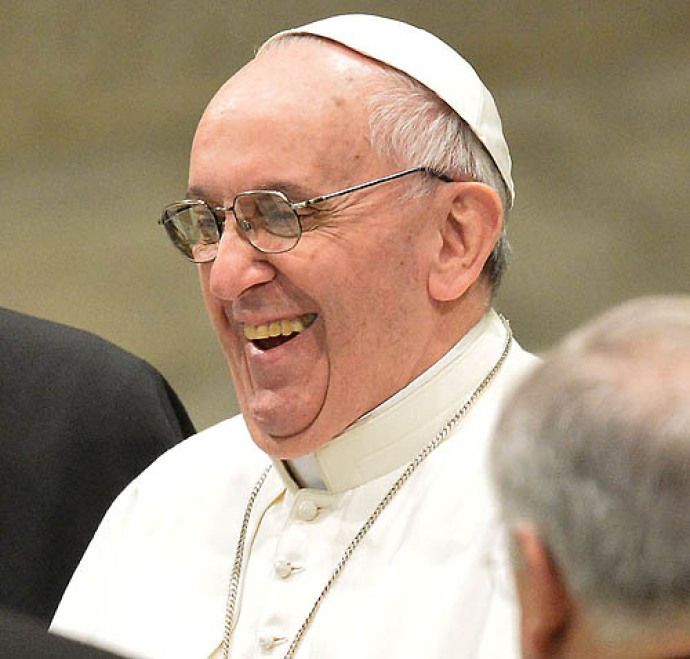
Dear Fred,
Excerpt from "Pope Francis Provides Inspiration For All Faiths": "(The new pope) seeks a simpler church, more closely identified with the poor."
A question for you...
Is there one American conservative in a hundred --- is there one American"conservative" in a thousand? --- who wants closer identification with the poor?
Didn't God design "the invisible hand" to transform the poor into successful consumer units?
Free markets will provide for every single human being - effortlessly.
The traditional "disciplines of virtue" are unnecessary.
Just liberate markets.
For additional insight, see the "woe passages." http://paxonbothhouses.
On "Judgment Day," legions of Americans --- wrapped in flags and groveling before The Golden Calf --- will realize Cowboy Capitalism is antithetical to Yeshua's teaching.
See Pope Francis on "Golden Calf Worship" and "The Cult of Money." http://paxonbothhouses.blogspot.com/2013/06/pope-francis-hits-out-at-global-cult-of.html
On "Judgment Day," legions of Americans --- wrapped in flags and groveling before The Golden Calf --- will realize Cowboy Capitalism is antithetical to Yeshua's teaching.
See Pope Francis on "Golden Calf Worship" and "The Cult of Money." http://paxonbothhouses.blogspot.com/2013/06/pope-francis-hits-out-at-global-cult-of.html
Pax on both houses,
Alan
PS
"I want mercy, not sacrifice." Matthew - 9:13 http://biblehub.com/

- Michael Gerson
- Opinion Writer
Pope Francis provides inspiration for all faiths
We tend to remember leaders in characteristic poses. For Pope Benedict XVI, the college professor, it was delivering a much-misunderstood lecture at the University of Regensburg, which made controversial reference to Islam. For Pope Francis, it is kneeling to wash the feet of a young Muslim woman in a prison on Holy Thursday. With due respect to Benedict’s learning, Francis’s symbolic act managed to more effectively communicate the essence of the Christian gospel.
The Catholic tradition, from catacombs to cathedrals, is filled with potent symbols. There is the cross, the fish, the dove and the lamb. There is Mary’s blue, the purple of penance and the red of martyrs’ blood. Francis excels at the symbolism of humility. He lives in a two-room apartment, dresses in simple white and speaks in direct, colloquial language. His assistant is reputed to carry a cellphone, making the pope callable, maybe.
Francis has not yet issued sweeping declarations. But his symbolism has begun seeping into substance. He seeks a simpler church, more closely identified with the poor. And he sounds like an institutional reformer. Here is the Vatican’s account of one papal sermon: “When the Church wants to throw its weight around and sets up organizations, and sets up offices and becomes a bit bureaucratic, the Church loses its principal substance and runs the risk of turning itself into an NGO [nongovernmental organization]. And the Church is not an NGO. It is a love story.”
In the context of American Catholicism, the left naturally finds this heartening. Francis is not on the verge of ordaining women priests, but a reforming pope legitimizes the idea of reform. And he is also an enthusiastic critic of capitalist excess. Yet much of the American Catholic right has also welcomed the fresh air of Francis’s style, while emphasizing his complete faithfulness to traditional church teaching.
Some of this good feeling is the traditional, optimistic attempt of partisans to impute their own priorities to a yet-unformed papacy. But there seems to be something deeper at work. The problems of the Catholic Church — from abuse scandals to corruption in the Roman Curia — seem so large that other disputes have been marginalized. If Francis’s touch can stop the hemorrhage of ecclesiastical authority, both left and right seem prepared to set aside some old arguments. The result is an outbreak of patience and generosity of spirit.
Many non-Catholics have found the new pope’s social teaching contradictory and confusing. Sometimes he sounds like a Latin American lefty, calling for “social justice” and criticizing “selfish profit.” Sometimes he is defiantly un-modern on matters sexual. The U.S. media have struggled to find and apply a simple ideological label — apparently their main journalistic calling.
But this is not really Francis’s problem. He holds a doctrine identical to his predecessors’— one that was equally misunderstood when they taught it. Catholic social thought is not explainable in terms of left and right. Nor is it a moderate compromise between them. It starts from an entirely different premise.
Both American liberalism and conservatism put a priority on negative rights — the freedom from external restraint. For some, this means unrestricted social autonomy and choice; for others, unrestricted economic liberty. Catholic social doctrine asserts that human beings have moral and social natures, and that true freedom is found in their fulfillment. Men and women are liberated by ethical behavior; their happiness is completed in family and community; and all who share a community are diminished when any are destitute and hopeless. This perspective is fundamentally at odds with moral relativism and economic libertarianism. It transcends our ideological debates and challenges all sides of them.
Pope Francis, however, is adding something to this teaching — without which, it means little. “This guy,” says Stephen Schneck of Catholic University, “seems to be trying to be like Jesus, the image of Jesus in the Gospels.” The one who brought good tidings to the poor, bound up the brokenhearted and proclaimed liberty to the captives.
Whatever your view of Christianity, the example of Jesus remains one of history’s most surprising constants. A man who never wrote a word, who spent three years teaching in an obscure corner of a vanished empire, still stirs the deepest longings of the human heart. When we see his image even partially reflected in another human being, it appeals beyond every political division. When we see his image even partially reflected in the church he founded, true authority returns.
Read more from Michael Gerson’s archive
No comments:
Post a Comment